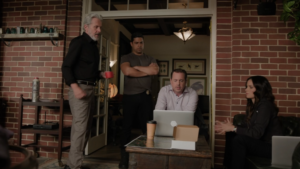George Mullen is struggling, not just with the growing cyber crisis but with his mind. As he prepares to move into his new HQ, he tries to recall his late-night conversation with Mossad agent Natan. The only thing he remembers? He was the one who wrote the chilling words: Who Killed Bambi?
Meanwhile, a hacker frantically destroys his hard drives before heading to a Bronx hideout, only to find GRU officer Alexi Lebedev waiting. The rest of his team is already dead, and he barely escapes with his life.
At the Zero Day Commission, George has 72 hours before the White House pressures Evelyn Mitchell to pin the attack on Russia. Surveillance footage of the hacker and Alexi surfaces, but George insists on finding the hacker first before making any accusations. He also questions whether Anna, his ghostwriter, really died in the train crash—he’s convinced he saw her after her supposed death.

In the shadows, Roger has his problems. A hedge fund manager named Lyndon, who shorted the market before Zero Day, pressures him for inside information. Roger wants out, but Lyndon isn’t letting go that easily. Meanwhile, George’s wife, Sheila, senses trouble and tries to recruit their former chief of staff, Valerie, to protect him.
Things escalate when Congresswoman Alex Mullen, George’s daughter, is assigned to oversee the commission. While Roger attempts to persuade her otherwise, their relationship turns out to be more than just political, they hook up in secret.
George, however, is focused on finding the hacker, who turns out to be an undercover NSA agent named Patrick. They capture him before Alexi can silence him, but before they can get answers, a truck mows down Alexi in broad daylight. The driver? Another Russian operative, cryptically claims that Russia isn’t behind Zero Day.
As Patrick is interrogated, he reveals that his hacker group never intended for Zero Day to happen, they were manipulated into creating the code. The real culprits? A domestic terrorist group called the Reapers. President Mitchell halts a planned cyberattack on Russia, but the damage is done. George’s mental state worsens when a TV anchor quotes something from the exact moment of his mysterious call with Natan. Finally, he remembers, Natan was warning him about Proteus, a government weapon.

At a press conference, George publicly names Proteus as part of the crisis. But in Washington, CIA agents scramble, Proteus was top secret. What exactly has George just exposed?
This episode ups the ante, mixing cyber warfare, political backstabbing, and George’s unraveling psyche. The tension is palpable—who’s pulling the strings, and is George still sharp enough to figure it out?
Robert De Niro continues to deliver, portraying George as both authoritative and vulnerable. His memory lapses add a psychological thriller element that keeps us questioning what’s real. The supporting cast, however, remains underutilized. Jesse Plemons’ Roger is intriguing, but the rest of the ensemble needs more development to truly feel like power players.
The episode smartly draws from real-world political tensions, but George’s reckless revelation about Proteus shows that he may not be as in control as he believes. Is he the hero in this crisis, or just another pawn? Either way, the fallout is going to be explosive.





